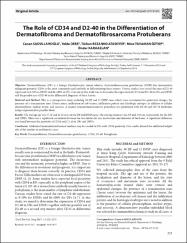The Role of CD34 and D2-40 in the Differentiation of Dermatofibroma and Dermatofibrosarcoma Protuberans

View/
Date
2017Author
Sadullahoğlu, CananDere, Yelda
Rezanko Atasever, Türkan
Tunakan Öztop, Mine
Karaaslan, Önder
Metadata
Show full item recordAbstract
Objective: Dermatofibroma (DF) is a benign fibrohistiocytic tumor whereas dermatofibrosarcoma protuberans (DFSP) has intermediate malignant potential. CD34 is the most commonly used antibody in differentiating these tumors. Various studies have stated the rates of D2-40 expression as 0-50% in DFSPs and 86-100% in DFs. Our aim in this study was to determine the expression of CD34 and D2-40 in DFs and DFSPs and the possible use of D2-40 in the differential diagnosis of these lesions. Material and Method: This is a retrospective study including 30 DF and 15 DFSP cases which were reevaluated for epidermal changes, the presence of a transmission zone (Grenz zone), infiltration of soft tissues, infiltration pattern and histologic subtypes in addition to cellular pleomorphism, nuclear atypia, and necrosis. A manual immunohistochemistry procedure was performed with D2-40 and CD 34 antibodies using a representative paraffin block. Results: The average age was 37.36 and 42.86 years in the DF and DFSP cases. The average diameter was 0.9 and 5.03 cm, respectively, for the DFs and DFSPs. There was a significant correlation between the two entities for sex, localization and diameter of the lesion. A significant difference was found between the positivity of CD34 and D2-40 in DFs and DFSPs. Conclusion: Additional immunohistochemical markers may be needed in DFs with CD34 positivity. Our results showed the additional helpful role of this marker in problematic cases.

















